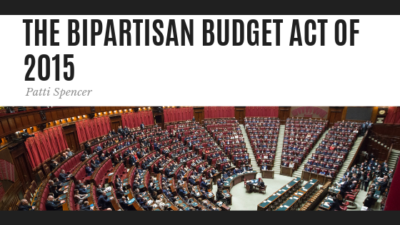The Bipartisan Budget Act of 2015

President Obama, Nov. 2, signed into law the Bipartisan Budget Act of 2015, a two-year budget deal. The legislation raises the federal debt limit and is paid for in part by provisions eliminating two Social Security retirement benefit claiming strategies, a provision to prevent a significant increase in Medicare Part B premiums for some, and provisions that will make it easier for the Internal Revenue Service to audit large partnerships.
Social Security
The strategy for a married couple to “file and suspend” involves one spouse filing an application for retirement benefits when he or she reaches full retirement age and immediately requesting that benefits be suspended, allowing his or her eligible spouse to file for spousal benefits. The file-and-suspend strategy has been most commonly used when one spouse has much lower lifetime earnings, and thus will receive a higher retirement benefit based on his or her spouse’s earnings record rather than on his or her own earnings record.
Under the new law if an individual chooses to suspend retirement benefits, neither the individual nor his or her spouse can receive spousal benefits during the suspension period. The effective date is six months from enactment, so there is still time for some folks to utilize this claims strategy.
Another strategy is for one spouse to file for spousal benefits first, then switching to his or her own higher retirement benefit later. If a spouse reaches full retirement age and is eligible for both a spousal benefit based on his or her spouse’s earnings record and a retirement benefit based on his or her own earnings record, he or she could choose to file a restricted application for spousal benefits only, then delay applying for retirement benefits on his or her own earnings record (up until age 70) in order to earn delayed retirement credits. This strategy is also eliminated because the new legislation provides that anyone applying for either a spousal or retirement benefit is deemed to have filed an application for the other type of benefit as well.
Medicare Part B
There will be no cost of living increase for monthly Social Security benefits in 2016. There is a “hold harmless” provision in the Social Security Act that protects about 70% of Social Security beneficiaries from increases in Medicare Part B premiums when there is no Social Security cost-of-living increase. That means that Medicare Part B premium increases have to be paid by the 30% of Medicare beneficiaries who are not protected. These beneficiaries include those with higher incomes who are subject to income-adjusted Part B premiums, low-income beneficiaries whose Part B premiums are paid by Medicaid, beneficiaries who are enrolled in Medicare but not yet receiving Social Security benefits, and new Medicare or Social Security enrollees. Medicare Part B premiums for some of these individuals were scheduled to increase by as much as 52%.
To stop this, the new legislation sets a new 2016 Part B premium of $120 for certain beneficiaries not protected by the “hold harmless” provision. This figure is the amount the premium would be if the increase was spread among all beneficiaries. These beneficiaries will pay an additional $3 in monthly Part B premiums until the shortfall is made up.
Family Partnership Rules
The House summary of the Act explains:
“The provision would clarify that Congress did not intend for the family partnership rules to provide an alternative test for whether a person is a partner in a partnership. The determination of whether the owner of a capital interest is a partner would be made under the generally applicable rules defining a partnership and a partner. In addition, the family partnership rules would be clarified to provide that a person is treated as a partner in a partnership in which capital is a material income—producing factor whether such interest was obtained by purchase or gift and regardless of whether such interest was acquired from a family member. The rule, therefore, is a general rule about who should be recognized as a partner.”
